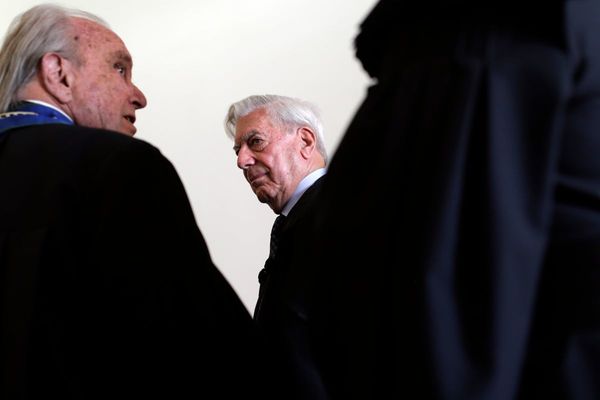
It’s Wednesday lunch hour at the Apollo Global Management cafeteria, an 8th floor space featuring uniformly, blindingly white marble floors and furnishings, and framed in floor-to-ceiling windows that overlook Manhattan’s Central Park Pond. The troops are attired more Silicon Valley than Wall Street in jeans or slacks (nary a suit, tie or cufflink in sight). They queue for lattes and espressos at the barista station, or at the heavily trafficked seltzer bar, where they can choose from a soda fountain-like array of flavor pumps that dispense coconut, keylime, cucumber and a half-a-dozen other plain-bubble enlivening extracts.
A booth in this buzzing venue happens to be the favorite meeting place for CEO Marc Rowan, and that’s where we’re speaking this morning. To get here, Rowan descends the interior staircase from the trading floor above, where upon taking charge as the pandemic raged in early 2021, he settled in an interior, zero-views office to monitor the action up-close. Leon Black, Rowan’s co-founder and predecessor, had occupied a 42nd floor suite, festooned with French antique handguns and museum-quality Impressionist paintings before resigning amid an explosive scandal revealing that he'd paid $158 million of his own funds for personal finance advice to late sex offender Jeffrey Epstein. But Rowan preferred his relatively spartan digs to Black’s sumptuous aerie.
It’s immediately clear from Rowan’s modest style that he’s distancing himself from the fearsome image Black created. Under the Black’s leadership, Apollo was long regarded as a hard-edged deal shop that didn’t blanch at skewering bondholders in pursuit of huge returns for their investors. In the past, the firm was indeed best-known for its record of high-profile private equity scores, including gaming giant Harrah’s Entertainment in the aughts, and in the last few years [hotlink]Yahoo, the Cox Media TV empire and Sun Country Airlines.
Rowan, who’s slight of build and sporting an open-collared white shirt, describes his strategy with a kind of quiet, cartesian logic. He speaks in a single, low tone of voice, and seems to express his thoughts in complete paragraphs. You never hear such placeholders as “it’s like” or “you know.” Little surprise that he’s known in-house as “the professor.” But Rowan, 61, doesn’t talk like a wonk. Instead, he unfurls everyday metaphors to sketch his vision for where the investment world is heading. A sampling: “Institutions are living too much in a two-ice cream world of chocolate and vanilla, of publicly traded debt and equity. They’re about to move to Baskin-Robbins.”
The buffet he's describing is private debt. Apollo’s spent $8 billion to buy, build and invest in no fewer than 16 teams, numbering 4,000 people, that scour the globe for opportunities in this new-ish and profitable market. "MidCap" makes loans to medium sized clients in life sciences, quick service franchises like Dunkin’ Donuts’ and Burger Kings, and more. "Wheels" finances automotive fleets for the likes of Hertz, Pfizer and Allstate, and "PK Airfinance," bought from GE Capital, extends credit to carriers for their aircraft purchases. Apterra Infrastructure provides capital for solar and wind farms.
The securities are a great deal for Apollo because it’s willing to accept “illiquidity,” the inability to easily exit, for much higher rates than they’d garner on readily-saleable bonds. And those airlines, rent-a-car outfits, rail carriers and commercial property owners are willing borrow at a premium for several reasons. First, Apollo can move much faster than a syndicate of Wall Street banks working to underwrite a bond offering (not to mention such offerings often fail for lack of demand or due to volatile market conditions). Second, Rowan has orchestrated a wholesale merger with giant insurer Athene, whose immense balance sheet can provide big ticket financings, often totaling several billion dollars, at warp speed (more on that later). Third, Apollo fashions tailored solutions not possible under the tight rules governing bond issues. For example, Apollo won a mandate from AB InBev by structuring a deal that coupled purchasing a large minority interest in AB’s U.S. metal-based container plants with extending a $3 billion loan secured by the canning facilities.
That nexus is generating some of the fattest current returns in the world of alternative asset management. In the first half of 2023, Apollo posted $2.0 billion in adjusted earnings, or an annualized $4.0 billion, a pace that outstripped its 2022 full-year showing by 21%. Its shares are also on the march. Since Rowan took charge in late March of 2021, they’ve jumped from $47 to $89, or 89%, adding $23 billion in market cap. Of its five top alternative asset rivals over that span, only ARES—a fixed income specialist that differs from Apollo by focusing on middle-market clients and non-IG debt—fared better at +94%, while Apollo topped Blackstone (+58%), KKR (+33%), Brookfield (-11%), Carlyle (-11%) and TPG (-12% since going public in January of 2022).
And for such a modest-appearing CEO, Rowan makes some audacious projections. He’s pledging to raise Apollo’s AUM two-thirds by 2026 to $1 trillion, and nearly double income that’s already at running at record levels. “We think Apollo is setting the playbook for the alternative investment industry,” says Sam Martini of OCO Capital Partners, a money manager that owns $100 million in Apollo (APO) shares. “The other guys have many discreet private debt funds, but Apollo has this giant factory [Athene] that’s bringing in large amounts of new capital all the time. And Rowan’s shown he can invest those dollars at the best yields in a wide array of assets that are increasingly originated and structured in-house. This is an extraordinary competitive advantage that to date remains underappreciated.”
“I don’t think I’ve discovered fire," Rowan says, sipping a barista cappuccino from a paper cup. "I think we’re just logically looking at trends, and we’ve picked a really, really big market that’s got the best future in the world of credit.”
The Gods of finance
Rowan's vision for his firm dates all the way back to his undergrad days.
“While studying for my MBA at the Wharton School in the early 1980s,” Rowan recalls, “I was assigned a faculty advisor who turned out to be the head of the actuarial sciences department. At the time, I couldn’t think of anything more boring. But he encouraged me to learn about statistics and probabilities.” When Drexel Burnham, where Rowan worked under mentor Mike Milken, imploded in 1990, he, Black and Josh Harris famously formed Apollo—and their first deal consisted of buying and rescuing a failed insurer called Executive Life. “It was as if I was the only kid in school who’d even cracked the book and could raise their hand and answer the question. Thanks to the actuarial studies, I knew more than anyone else about insurance risks,” he recalls. Rowan calls the challenge of repairing the Executive Life operations, subsequently sold at a big profit, “an amazing education.”
In 2009, insurance entrepreneur Jim Belardi approached Rowan about forging an annuities platform that would mirror the strategy pioneered by Eli Broad in the 1980s at SunAmerica: Investing the premium stream in high-yielding, long-dated assets eschewed by traditional insurers. “Eli taught me that people who think like owners make it happen,” recalls Belardi. In the GFC’s wake, insurers were dumping underwater books of business at deep discounts, and the pair devoured the blocks. Apollo collected fees managing the investments, and Rowan and Belardi, who heads Athene to this day, kept growing its insurance book via multiple acquisitions. “From the start,” says Belardi, ”Marc emphasized that people are underprepared for retirement, and that the segment offered vast opportunities.”
In 2014, they planted their strategy in Europe by founding Athora [Apollo has a long history of naming companies it incubates after Greek deities—“We’ve even invented names that just sound like the ones for Greek gods, but are just names and gods of nothing,” says Rowan.] Today, Athora stands as the largest European provider of retirement services, backed by $50 billion in assets, all managed by Apollo.
By 2021, Athene was prospering as a public enterprise 35% owned by Apollo, and a major source of its AUM. In January of 2020, Leon Black—hit by the first wave of the Epstein scandal—announced that he’d step down as CEO by July, but remain as chairman. Rowan’s coup in building a thriving non-traditional debt business made him Black’s choice as a successor. “Black realized that the company was now mature and needed to nurture a team culture, and that Marc was the right guy for that job,” says Milton Berlinski, a founder of Reverence Capital who’s done numerous deals with Apollo and been a friend of Rowan’s for forty years. In fact, Rowan had left the firm on a self-declared “semi-sabbatical” the previous summer, and planned to step away from day to day management and revel in the “peace” of his newfound hobby, remodeling and curating restaurants that he owns in the Hamptons.
Black asked Rowan three times over the years to take the CEO job, and Rowan kept turning him down. The reason, Rowan explained to me, is that he didn’t want to run Apollo as a triumvirate with his two co-founders. “You can respect your partners and also realize that three people can’t run a company,” he told me. “When we agreed on things, it was great. When we disagreed, it became deadlocked. What did we disagree about? The coffee at the coffee bar, you name it.”
But in March of 2021, Black suddenly exited both the CEO and chairman positions and Harris left to focus on a collection of sports teams that now includes the NFL’s Washington Commanders. “It was the opportunity to run the business myself that changed my mind,” says Rowan.
While his building prowess won him the job, his lieutenants praise his management style. “Marc wants us reputationally perceived as a partner of choice,” says Chris Edson, who heads the origination network. “Under his leadership, he’s also given people more independence and responsibility.” Adds Berlinski, “A lot of smart people think they know the answers and don’t listen. Marc’s a great listener. And on the spectrum of humble to arrogant, he’s closer to humble, a relative rarity on Wall Street.” Rowan still weighs in on deals, not to dictate the terms to his people as often happened in the past, but offer advice on how to get them done—especially in crafting how they’re presented. Cultivating a team of extremely long-tenured employees is an un-Wall Street tradition Rowan strives to preserve. “We want people to spend their entire careers at the firm,” he says. Indeed, the top 10 executives have been at the Apollo an average of 17 years.
The shift in emphasis from private equity to debt dovetails with Rowan’s push to soften Apollo’s image. (PE is notorious for generating bad publicity: A new book co-authored by Pulitzer Prize-winner Gretchen Morgenson scorches the field for “tanking the companies it acquires” and putting “our entire financial system at risk.”)
But Rowan had a different vision. In March of 2021, three months after the announcement that he’d become CEO and days before he officially took the job, Apollo agreed to purchase the 65% of Athene it didn’t own in a deal valued at $11 billion. The merger greatly changed the Apollo model. It’s now much closer to insurers such as Mass Mutual than to its previous peers, alt giants such as Blackstone and Carlyle. The Athene merger put a mountain of new capital, now totaling $258 billion, directly on its books, and piled well over $200 billion in annuity liabilities payable to policyholders on the opposite side of the ledger.
It should also be noted that others are catching on to Apollo’s playbook: Brookfield recently bought two insurers for a total of almost $10 billion, and Carlyle holds a large participation in Fortitude, a Canadian reinsurer, for which it manages $55 billion, while KKR’s majority stake in Global Atlantic adds $142 billion to its AUM.
“Apollo is turning the industry on its head by generating premiums in-house from Athene, and generating higher spreads than its competitors,” says a portfolio manager at a major investment firm that owns Apollo shares. Adds Matt Swain, CEO of placement agent Triago that represented Sofinnova Partners in a deal where Apollo agreed to invest 1 billion euros in the European life sciences venture capital firm’s funds, “Athene is their superpower. They just have a much bigger war chest than everyone else. They can raise money from limited partners, but they don’t have to. They can just go to their interior well, and that’s Athene.”
Apollo moves in on the big banks’ territory
Rowan has been canny at exploiting a lane that used to be almost exclusively occupied by the JP Morgans, PNCs and other big banks. But post Dodd-Frank, those major lenders were required to put up lots of additional capital to extend loans to corporate America. Rowan predicts that post-SVB, new rules will further restrict the volumes of loans the banks can add to the revenue-generating side of their ledgers. “Today, the banks supply less than 20% of all credit to businesses,” Rowan says. “The need for funding private debt switched from the big lenders to the investment marketplace.” Rowan stresses that he’s not competing with banks,. “We don’t want to sell the equity advice, M&A, treasury payments and FX solutions that are so important to Wall Street,” he says. Instead, he adds, Apollo covets the long-term financings that the banks increasingly lack sufficient capital to support.
Those pension funds, insurers and the LPs in debt funds are among Apollo’s core customers. Rowan believes that although they’ve added a lot more private credit of late, the big funds are bound to rapidly raise their allocations in the years to come. “Private debt offers much higher yields than public debt, but it isn’t any riskier for a pension fund or insurer,” says Rowan. “They have retirement liabilities that come due many years hence. They don’t need money next Tuesday, but in say nine years. They can earn 200 to 300 basis points extra on fleet financings or the top-rated tranches in CLOs or RMBS or credit card portfolios that mature over the same periods, and that have a tiny level of defaults.”
The traditional PE franchise that fashions LBOs, collecting 2% fees on the investments from its limited partners and 20% of the gains, now accounts for only 17% of Apollo’s AUM. Funds comprising instruments called “hybrids,” that generate double-digit returns and feature both debt and equity characteristics, account for approximately 10%. At $450 billion, the debt side reigns in providing nearly three-quarters of all-in assets. “Over 70% of our fixed income AUM is investment grade across the firm,” says Rowan, “and the biggest part is the stuff that yields more than publicly traded debt, but that’s just as safe.”
The ‘golden age of annuities’
Still, Rowan’s brainchild is so new and different that it’s hard to predict whether over the long-term, it will perform as safely and profitably as it is now.
Athene’s roaring today because the steep, Fed-induced jump in rates has turned the formerly-plodding annuities expanse into a thriving landscape. “We’ve entered the golden age of annuities,” says Rowan. Annuities are insurance contracts that deliver a flow of future income under pre-set terms. Athene doesn’t write the riskiest varieties called “variable annuities,” where policyholders can lose principal in down markets. Retail customers are the largest source of business, followed by fast-growing “pension group annuities” or PGA inflows, where companies transfer their pension obligations, and assets backing them, to Athene. In May, it took an $8.1 billion part of AT&T’s giant retirement plan, a portion covering 92,000 retirees.
Since Q2 of 2022, the overall boom, and Athene’s premium rates, have lifted Athene’s AUM by one-third, after all outflows from folks whose policies mature, from $194 billion to the current $258 billion. Its inflows are running at an annualized clip of $60 billion, versus $28 billion in 2020. “They’re growing faster in annuities than they could have dreamed two years ago,” says Mike Brown, an analyst at KBW.
Rowan is quick to note that Athene model generates not just strong profits for the insurer, but powers a flywheel that’s attracting lots of fee-generating business for the traditional Apollo money management side. The main customers are rival insurers. They’re the principal investors in dozens of tailored funds that hold a total of roughly $100 billion invested in private credit. It’s part of the trend that Rowan’s counting on to fuel the doubling of Apollo’s assets-under-management to $1 trillion that he’s predicting by 2026. “We’re in the ‘fixed income replacement business,’” says the Oracle of Private Credit. “Next will come the pension funds, endowments and family offices.”
A fall in rates could also kill the boom in annuities sales that now fuels the Apollo engine at high torque, could derail Rowan’s big forecasts the future. His continued success hinges on doing lots of business with fellow insurers, as well as such institutions as pension funds and family offices. To fully win their confidence, Rowan must succeed in his charm campaign by softening Apollo’s prickly reputation, sharpened by roughhewn jockeying in private equity, into that of a genial partner.
Back in the cafeteria Rowan tells me, “Whenever new associates start, I tell them this isn’t about swashbuckling adventure, which is the impression from private equity. I’m glad people have that self-image. But I start by telling them that their job as a fiduciary manager is providing excess returns to retirees.”
It may not be swashbuckling, but on Wall Street money talks, and all of a sudden the whole class is heeding what the professor has to say.







